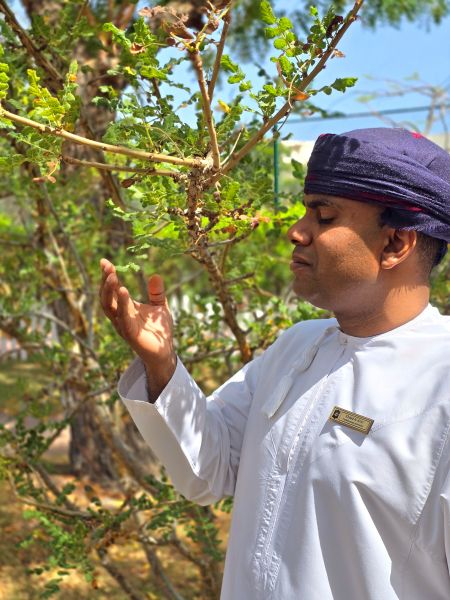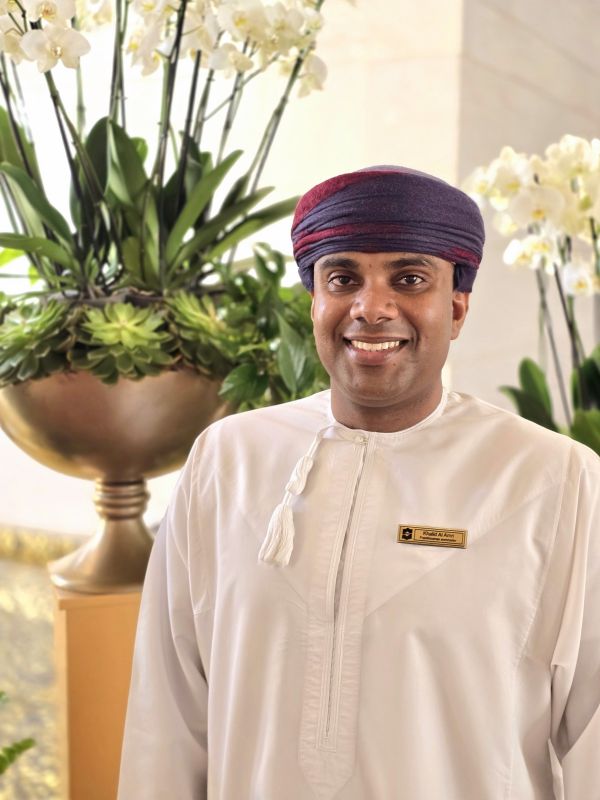 Khalid Al Amri, the Frankincense Sommelier, tending to his babies in the resort's frankincense garden - Shangri-La El Husn, Muscat
As I discovered during my recent stay, this considered approach transforms what could be yet another luxury Middle Eastern property into something truly distinctive: a retreat where the aromatic breeze carries whispers of Omani tradition whilst turtles grace the pristine shoreline. The majestic creatures are leaving guests hoping to witness hatching, the nesting season running from April to September, and hatching peaks in the summer months of July and August. The hotel employs devoted marine specialists to protect what is one of only five natural turtle nesting sites in Oman, underlining the ecological significance of this stretch of coast. Khalid Al Amri, the resort's Frankincense Sommelier, proved a key highlight of my stay and an ambassador of the frankincense culture, guardian of the history and the temple that is the Frankincense garden. I arrived expecting polished service and plush accommodation but departed with something far more valuable – a connection to both land and culture that defied my professional cynicism.
A garden of aromatic antiquity
The grounds of Shangri-La El Husn reveal their most extraordinary treasure not through architectural grandeur but through a modest garden that proves genuinely unique in Muscat's hospitality landscape. Here, twenty frankincense "babies" (as their caretaker, Khalid Al Amri, affectionately calls them) make this the only frankincense garden across all hotels in Muscat.
My introduction to this botanical treasure came through Khalid Al Amri, the property's Frankincense Sommelier, whose soft voice and profound passion immediately conveyed the garden's significance. "Welcome to the frankincense garden," he greeted me, gesturing proudly to the trees. "We planted these twenty babies in November 2019 in order to preserve the Omani heritage and to familiarise our guests with the importance of frankincense and its connection to Omani history." As we wandered amongst trees that, though only six years old, carry thousands of years of cultural weight, I found myself leaning in to catch his words, carried away by his evident devotion and contagious calm.
"I call them babies because they are six years old," he explained with paternal pride. "The tree needs to turn eight to ten years old to start producing resin. They can survive from 60 to 100 years and grow up to seven to nine meters high." His expertise reveals that these specimens belong to the Burseraceae family, which encompasses 645 varieties worldwide. With tender precision, he points out the distinguishing features: "Whenever you see a tree with what we call a dry or aromatic bark that is peeling or flaking from the branches, and with an aromatic sap present within the plant tissue, this is how you recognise a frankincense tree."
As he demonstrated how the tree responds to cuts by producing a protective sap – "much like our bodies produce blood to heal wounds" – my fingers traced the bark, releasing a scent that transported me to memories of cathedrals and hushed reverence. The Boswellia Sacra variety, he explained, produces what Europeans call "olibanum" or "incenso," but Omanis know as "luban," meaning "pure white." His storytelling wove through the biblical tale of the three wise men, noting how frankincense was considered "for the soul" due to its stress-relieving properties. "When you go to the spa, the music they play and the smell from the diffuser prepare your brain to send messages to your muscles. You will be relaxed in a couple of minutes. The same happens when you go to the mosque and smell the frankincense – your stress will be down to zero, far away from the noise of the world." As he spoke, I noticed my breathing had slowed, synchronizing with the gentle rhythm of his storytelling.
Sanctuary within sanctuary
Though El Husn – meaning "castle" in Arabic – offers all the expected luxuries of a five-star establishment, the true highlight of my accommodations was the seamless connection to the environmental surroundings. My Al Husn Panoramic Sea View Room's private balcony proved the ideal perch from which to appreciate the protected cove below, where the resort's conservation initiatives unfold against a backdrop of rugged shoreline and crystalline waters. This vantage point offered uninterrupted views of the turtle sanctuary, allowing guests to feel intimately connected to the natural rhythms of this ecological treasure.
The interior design pays homage to Omani heritage while subtly incorporating elements from the surrounding landscape. Locally-sourced stone features prominently, while the mashrabiya-inspired wooden screens filter natural light in patterns reminiscent of the dappled shade beneath the precious trees. The aromatic theme continues with intentionally incorporated natural elements: L'Occitane toiletries infused with frankincense oil, a pillow scented with the same valuable resin, and an evening turndown service featuring local honey-infused herbal tea and dates – nature's sweetest gift to this arid landscape.
Even the bathroom's soaking tub is positioned to capture expansive sea views, allowing guests to remain connected to the marine environment while in the most private of spaces. This thoughtful orientation toward nature reflects the property's understanding that true luxury in our disconnected age lies not in technological novelties but in fostering meaningful connections to place, heritage, and the natural world.
From soil to plate
The culinary programme at El Husn showcases Oman's native bounty through carefully crafted dining offerings. Breakfast at Sultanah Restaurant offers refined à la carte selections including shakshuka with house-made khubz bread and honey drizzled over fresh figs and labneh, alongside a tasting station featuring varieties from the resort's own beehives. During afternoon tea, I savoured delicate luban-infused pastries and a remarkably aromatic frankincense tea that provided my first taste of this essence as a culinary ingredient rather than merely an incense.
For dinner, Shahrazad presents elevated Omani cuisine – the standout being shuwa, lamb slow-roasted underground for 24 hours with aromatic smoke and served with caramelised date rice. Al Muheet delivers exceptionally fresh seafood, particularly the local fishermen's hammour, simply grilled with saffron-infused sauce. Throughout each venue, the precious resin makes subtle appearances in bread, cocktails, and desserts, connecting culinary moments to the broader cultural context of the destination.
Wellness Amongst the Elements
The Luban Spa represents El Husn's fusion of wellness practices with Omani healing traditions, where the resort's dedication to frankincense's ancient therapeutic properties finds its fullest expression. While I didn't indulge in a treatment during my stay, the spa's design impressed with thoughtful touches that connect wellness to the natural environment. Post-treatment, guests are guided to a private meditation garden where Khalid offers frankincense rituals, demonstrating the proper way to direct the aromatic smoke – "inhaling wisdom," as he poetically described it.
"Luban is for the soul," he explained, "because the smoke puts your stress down to zero." The spa programme extends beyond individual treatments to include complimentary sunrise yoga on a sea-facing platform, guided meditation sessions in the frankincense garden, and educational workshops where guests learn to create their own frankincense-based products.
The spa's commitment to sustainability manifests through refillable containers, and biodegradable packaging – proving that indulgence and environmental consciousness need not be mutually exclusive. For guests seeking additional wellness options, the Chi Spa at the adjacent Shangri-La Barr Al Jissah is also available.
Nature's classroom
The activities programme at El Husn showcases meaningful engagement rather than mere indulgence. The marine conservation initiative allows guests to witness the release of baby green turtles making their perilous journey to the sea – a moving encounter enhanced by the staff's evident commitment to protecting these endangered creatures. During my stay, however, they seem to play hide and seek, showing up a day before my arrival, and playing shy for the rest of the week. Needless to say, I was disappointed as I had hoped to catch a glimpse of the cute tribe.
For cultural immersion, Khalid's workshops cover everything from identifying quality luban to traditional uses, his knowledge presented with refreshing humility. What distinguishes these activities from typical resort offerings is their authenticity – these aren't superficial encounters created solely for tourists but extensions of the establishment's genuine commitment to preserving Oman's natural heritage.
A legacy in the making
As my stay at Shangri-La El Husn concluded, what lingered wasn't just the aroma of luban but a deeper appreciation for a venue that embraces its responsibility as a custodian of Omani heritage. Through Khalid's passionate stewardship of the frankincense garden, the marine team's commitment to turtle conservation, and the culinary brigade's thoughtful interpretation of local ingredients, El Husn demonstrates how hospitality can contribute meaningfully to cultural and environmental preservation.
The resort achieves that rare balancing act – delivering the refined comfort expected of the Shangri-La brand whilst creating moments that feel authentically connected to place. As I reluctantly departed, a small package arrived in my transfer vehicle – a vial of the precious resin harvested from the garden with a handwritten note from Khalid explaining proper burning techniques. It was a fitting farewell from an establishment that understands true sophistication lies not in ostentation but in lasting connections that endure long after checkout.
 Khalid Al Amri is the only official Frankincense Sommelier in the world - Shangri-La El Husn, Muscat |